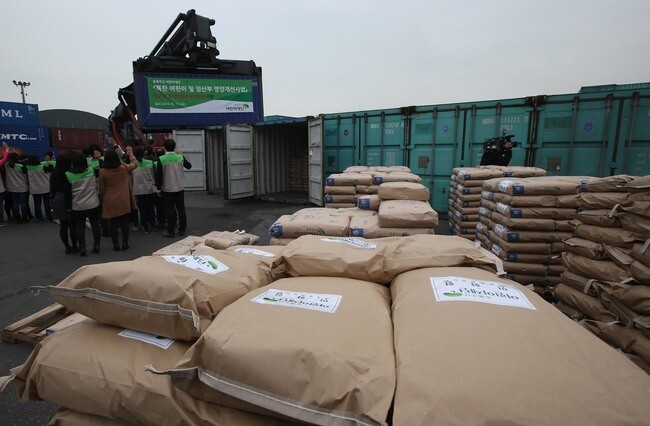hankyoreh
Links to other country sites 다른 나라 사이트 링크
UN adopts guidelines for expediting humanitarian aid to North Korea

The UN Security Council (UNSC) adopted guidelines for the timely provision of humanitarian aid to North Korea, which comes amid the US’s ongoing emphasis on the importance of forceful sanctions. The decision is drawing particular attention with reports that the US played a leading role.
According to an AP report on Aug. 6, the UNSC’s North Korea sanctions committee approved new guidelines that speed up the provision of humanitarian aid to North Korea. The Netherlands, which chairs the committee, said none of the 15 members of the UNSC raised objections to the new guidelines.
The guidelines stress that North Korea sanctions are not intended to restrict food, cooperation, or humanitarian aid for North Korean residents, adding that the UNSC may grant exceptions to the measures imposed in its resolutions depending on the circumstances. They also instruct countries and NGOs attempting to provide humanitarian aid to submit ten pieces of information to the North Korea sanctions committee, including an explanation on the support items, the quantities and pathway, and grounds for requesting an exemption from sanctions.
The guidelines went on to say the UNSC would proceed with exemption request procedures according to the same guidelines as quickly as possible in view of the time-sensitive nature of humanitarian aid. The measure is expected to result in faster delivery times for medical equipment, medications, food, and other relief items. Following a visit to North Korea last month, UN Under-Secretary-General for Humanitarian Affairs Mark Lowcock reported “quite substantial delays” in the purchasing and delivery of humanitarian items not subject to sanctions.
The foreign press reported that US Ambassador to the UN Nikki Haley and experts were a driving force behind the guidelines. The move may be seen as a conciliatory gesture from Washington on humanitarian issues even it aims to keep pressure on North Korea with sanctions. CBS described the US as “extend[ing a] small olive branch” to the North.
Pompeo is preparing for another visit to North Korea
Meanwhile, White House National Security Advisor John Bolton reported that US Secretary of State Mike Pompeo is preparing for another North Korea visit.
When asked about a possible second North Korea-US summit in an Aug. 6 interview with Fox News, Bolton said there was nothing scheduled, but added that Pompeo was prepared to return to Pyongyang and meet with leader Kim Jong-un to verify additional progress. In another appearance on PBS, Bolton said he had asked Pompeo to meet with Kim again to discuss inspections and the submission of a nuclear list.
In its response to the UNSC guidelines, the South Korean Ministry of Unification said, “We look forward to resolving practical difficulties with sending aid to North Korea and to increased support from the international community.” On the matter of spending the US$8 million Seoul announced it would be contributing to international organizations, a ministry official responded only in general terms.
“We have been in consultation with international organizations, and we plan to pursue [the contribution] at an appropriate time while taking the overall conditions into account,” the official said. When asked whether the UN guidelines would be applied in the consultation process, the official said, “I imagine we will also be discussing that part.”
In Sept. 2017, the South Korean government announced plans to contribute US$8 million for mothers’ and children’s public health and nutrition support efforts by the WFP and UNICEF. The payment has been delayed since then following North Korea’s ballistic missile test launches and sixth nuclear test late last year.
By Hwang Joon-bum, Washington correspondent
Please direct comments or questions to [english@hani.co.kr]

Editorial・opinion
![[Editorial] Yoon must halt procurement of SM-3 interceptor missiles [Editorial] Yoon must halt procurement of SM-3 interceptor missiles](https://flexible.img.hani.co.kr/flexible/normal/500/300/imgdb/child/2024/0501/17145495551605_1717145495195344.jpg) [Editorial] Yoon must halt procurement of SM-3 interceptor missiles
[Editorial] Yoon must halt procurement of SM-3 interceptor missiles![[Guest essay] Maybe Korea’s rapid population decline is an opportunity, not a crisis [Guest essay] Maybe Korea’s rapid population decline is an opportunity, not a crisis](https://flexible.img.hani.co.kr/flexible/normal/500/300/imgdb/original/2024/0430/9417144634983596.jpg) [Guest essay] Maybe Korea’s rapid population decline is an opportunity, not a crisis
[Guest essay] Maybe Korea’s rapid population decline is an opportunity, not a crisis- [Column] Can Yoon steer diplomacy with Russia, China back on track?
- [Column] Season 2 of special prosecutor probe may be coming to Korea soon
- [Column] Park Geun-hye déjà vu in Yoon Suk-yeol
- [Editorial] New weight of N. Korea’s nuclear threats makes dialogue all the more urgent
- [Guest essay] The real reason Korea’s new right wants to dub Rhee a founding father
- [Column] ‘Choson’: Is it time we start referring to N. Korea in its own terms?
- [Editorial] Japan’s rewriting of history with Korea has gone too far
- [Column] The president’s questionable capacity for dialogue
Most viewed articles
- 1Months and months of overdue wages are pushing migrant workers in Korea into debt
- 2Trump asks why US would defend Korea, hints at hiking Seoul’s defense cost burden
- 3At heart of West’s handwringing over Chinese ‘overcapacity,’ a battle to lead key future industries
- 4[Editorial] Yoon must halt procurement of SM-3 interceptor missiles
- 5Fruitless Yoon-Lee summit inflames partisan tensions in Korea
- 6Dermatology, plastic surgery drove record medical tourism to Korea in 2023
- 71 in 3 S. Korean security experts support nuclear armament, CSIS finds
- 8AI is catching up with humans at a ‘shocking’ rate
- 9First meeting between Yoon, Lee in 2 years ends without compromise or agreement
- 10[Guest essay] Maybe Korea’s rapid population decline is an opportunity, not a crisis